最新初中英语语法知识—动词的分类汇编及答案解析
- 格式:doc
- 大小:42.50 KB
- 文档页数:8
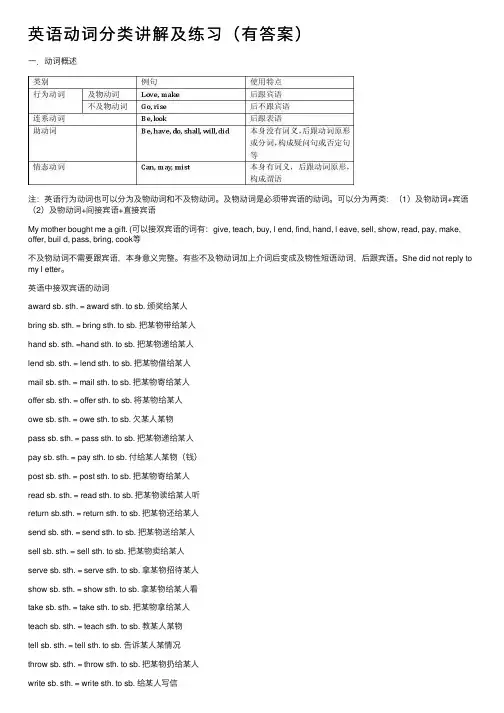
英语动词分类讲解及练习(有答案)⼀.动词概述注:英语⾏为动词也可以分为及物动词和不及物动词。
及物动词是必须带宾语的动词。
可以分为两类:(1)及物动词+宾语(2)及物动词+间接宾语+直接宾语My mother bought me a gift. (可以接双宾语的词有:give, teach, buy, l end, find, hand, l eave, sell, show, read, pay, make, offer, buil d, pass, bring, cook等不及物动词不需要跟宾语,本⾝意义完整。
有些不及物动词加上介词后变成及物性短语动词,后跟宾语。
She did not reply to my l etter。
英语中接双宾语的动词award sb. sth. = award sth. to sb. 颁奖给某⼈bring sb. sth. = bring sth. to sb. 把某物带给某⼈hand sb. sth. =hand sth. to sb. 把某物递给某⼈lend sb. sth. = lend sth. to sb. 把某物借给某⼈mail sb. sth. = mail sth. to sb. 把某物寄给某⼈offer sb. sth. = offer sth. to sb. 将某物给某⼈owe sb. sth. = owe sth. to sb. ⽋某⼈某物pass sb. sth. = pass sth. to sb. 把某物递给某⼈pay sb. sth. = pay sth. to sb. 付给某⼈某物(钱)post sb. sth. = post sth. to sb. 把某物寄给某⼈read sb. sth. = read sth. to sb. 把某物读给某⼈听return sb.sth. = return sth. to sb. 把某物还给某⼈send sb. sth. = send sth. to sb. 把某物送给某⼈sell sb. sth. = sell sth. to sb. 把某物卖给某⼈serve sb. sth. = serve sth. to sb. 拿某物招待某⼈show sb. sth. = show sth. to sb. 拿某物给某⼈看take sb. sth. = take sth. to sb. 把某物拿给某⼈teach sb. sth. = teach sth. to sb. 教某⼈某物tell sb. sth. = tell sth. to sb. 告诉某⼈某情况throw sb. sth. = throw sth. to sb. 把某物扔给某⼈write sb. sth. = write sth. to sb. 给某⼈写信2、双宾语易位时需借助介词for的常⽤动词book sb. sth. = book sth. for sb. 为某⼈预定某物buy sb. sth. = buy sth. for sb. 为某⼈买某物choose sb. sth. = choose sth. for sb. 为某⼈选某物cook sb. sth. = cook sth. for sb. 为某⼈煮某物draw sb. sth. = draw sth. for sb. 为某⼈画某物fetch sb. sth. = fetch sth. for sb. 为某⼈去取某物find sb. sth. = find sth. for sb. 为某⼈找到某物fix sb. sth. = fix sth. for sb. 为某⼈准备某物get sb. sth. = get sth. for sb. 为某⼈拿来某物make sb. sth. = make sth. for sb. 为某⼈做某物order sb. sth. = order sth. for sb. 为某⼈订购某物pick sb. sth. = pick sth. for sb. 为某⼈采摘某物prepare sb. sth. = prepare sth. for sb. 为某⼈准备某物save sb. sth. = save sth. for sb. 为某⼈留某物sing sb. sth. = sing sth. for sb. 为某⼈唱某物(歌)spare sb. sth. = spare sth. for sb. 为某⼈让出某物steal sb. sth. = steal sth. for sb. 为某⼈偷某物3、有的动词后接的双宾语易位时,既可⽤介词to引出间接宾语,也可⽤介词for引出间接宾语,含义相同。
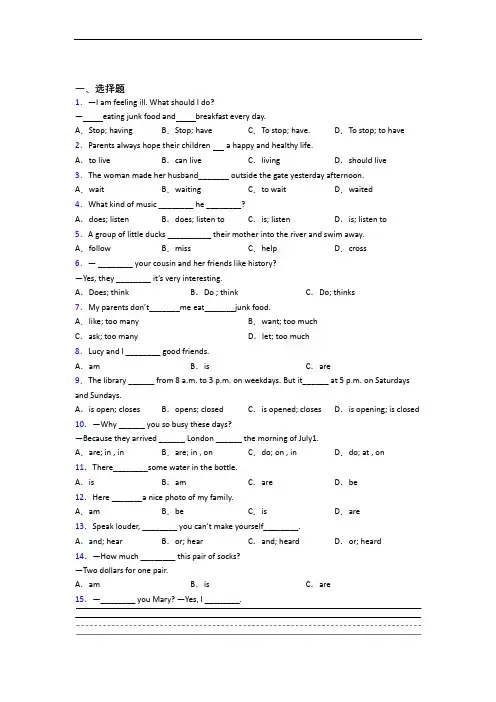
一、选择题1.—I am feeling ill. What should I do?— eating junk food and breakfast every day.A.Stop; having B.Stop; have C.To stop; have. D.To stop; to have 2.Parents always hope their children a happy and healthy life.A.to live B.can live C.living D.should live 3.The woman made her husband_______ outside the gate yesterday afternoon.A.wait B.waiting C.to wait D.waited4.What kind of music ________ he ________?A.does; listen B.does; listen to C.is; listen D.is; listen to5.A group of little ducks __________ their mother into the river and swim away.A.follow B.miss C.help D.cross6.— ________ your cousin and her friends like history?—Yes, they ________ it’s very interesting.A.Does; think B.Do ; think C.Do; thinks7.My parents don’t_______me eat_______junk food.A.like; too many B.want; too muchC.ask; too many D.let; too much8.Lucy and I ________ good friends.A.am B.is C.are9.The library ______ from 8 a.m. to 3 p.m. on weekdays. But it______ at 5 p.m. on Saturdays and Sundays.A.is open; closes B.opens; closed C.is opened; closes D.is opening; is closed 10.—Why ______ you so busy these days?—Because they arrived ______ London ______ the morning of July1.A.are; in , in B.are; in , on C.do; on , in D.do; at , on 11.There________some water in the bottle.A.is B.am C.are D.be12.Here _______a nice photo of my family.A.am B.be C.is D.are13.Speak louder, ________ you can’t make yourself________.A.and; hear B.or; hear C.and; heard D.or; heard 14.—How much ________ this pair of socks?—Two dollars for one pair.A.am B.is C.are15.—________ you Mary? —Yes, I ________.A.Are; is B.Is; am C.Are; am D.Am; is 16.—Do you know whom they will have ________the parts of car together?—Sorry,I have no idea.A.fix B.fixed C.to fix D.fixing17.Tom and Jim __________ in Class 3.A.is B.be C.am D.are18.—Let him __________us to learn English, OK? —Great!A.Helps B.to help C.help D.helping19.Li Ming's father __________want __________the new coat.A.doesn't; buy B.don't; to buy C.don't; buy D.doesn't; to buy 20.— When and where shall we meet?— Let's ________it half past nine.A.meet B.make C.do21.— How ________ your trip to Australia?—Great. I’ll go there again next year.A.was B.is C.are D.were22.--Lucy______her mother and her mother______very young.A.looks like; looks like B.looks like; looksC.looks; looks like D.looks; looks23.I don’t have a baseball, but my brother_________.A.is B.has C.does24.The air _______ fresh after the rain. And the sky is blue.A.feels B.tastes C.smells D.sounds25.________he_______big________?A.Does; has; foot B.Does; have; feet C.Do; have; foots【参考答案】***试卷处理标记,请不要删除一、选择题1.B解析:B【解析】【分析】【详解】句意:——我感觉生病了。

动词概述注:英语行为动词也可以分为及物动词和不及物动词。
及物动词是必须带宾语的动词。
可以分为两类:(1 )及物动词+宾语(2 )及物动词+间接宾语+直接宾语My mother bought me a gift.( 可以接双宾语的词有: give, teach, buy, le nd, find, han d, leave, sell, show, read, pay, make, offer, build, pass, bring, cook 等不及物动词不需要跟宾语,本身意义完整。
有些不及物动词加上介词后变成及物性短语动词, 后跟宾语。
She did not reply to my letter 。
英语中接双宾语的动词award sb. sth. = award sth. to sb. bring sb. sth. = bring sth. to sb. hand sb. sth. =ha nd sth. to sb. lend sb. sth. = lend sth. to sb. mail sb. sth. = mail sth. to sb. offer sb. sth. = offer sth. to sb. owe sb. sth. = owe sth. to sb. pass sb. sth. = pass sth. to sb. pay sb. sth. = pay sth. to sb. post sb. sth. = post sth. to sb. read sb. sth. = read sth. to sb. return sb.sth. = return sth. to sb. send sb. sth. = send sth. to sb. sell sb. sth. = sell sth. to sb. serve sb. sth. = serve sth. to sb. show sb. sth. = show sth. to sb. take sb. sth. = take sth. to sb. teach sb. sth. = teach sth. to sb. tell sb. sth. = tell sth. to sb. throw sb. sth. = throw sth. to sb. write sb. sth. = write sth. to sb.2、双宾语易位时需借助介词for的常用动词book sb. sth. = book sth. for sb. 为某人预定某物 buy sb. sth. = buy sth. for sb.为某人买某物choose sb. sth. = choose sth. for sb. 为某人选某物 cook sb. sth. = cook sth. for sb. 为某人煮某物颁奖给某人 把某物带给某人 把某物递给某人 把某物借给某人 把某物寄给某人 将某物给某人 欠某人某物 把某物递给某人 付给某人某物(钱) 把某物寄给某人 把某物读给某人听 把某物还给某人 把某物送给某人 把某物卖给某人 拿某物招待某人 拿某物给某人看把某物拿给某人 教某人某物告诉某人某情况 把某物扔给某人 给某人写信draw sb. sth. = draw sth. for sb. fetch sb. sth. = fetch sth. for sb. find sb. sth. = find sth. for sb. fix sb. sth. = fix sth. for sb. get sb. sth.= get sth. for sb. make sb. sth. = makesth. for sb. order sb. sth. = order sth.for sb. pick sb. sth. = pick sth. for sb.prepare sb. sth. = prepare sth. for sb.save sb. sth. = save sth. for sb.sing sb. sth. = sing sth. for sb.spare sb. sth. = spare sth. for sb. steal sb. sth. = steal sth. for sb. 3、 有的动词后接的双宾语易位时,既可用介词 to 引出间接宾语,也可用介词for 引出间接宾语,含义相同。
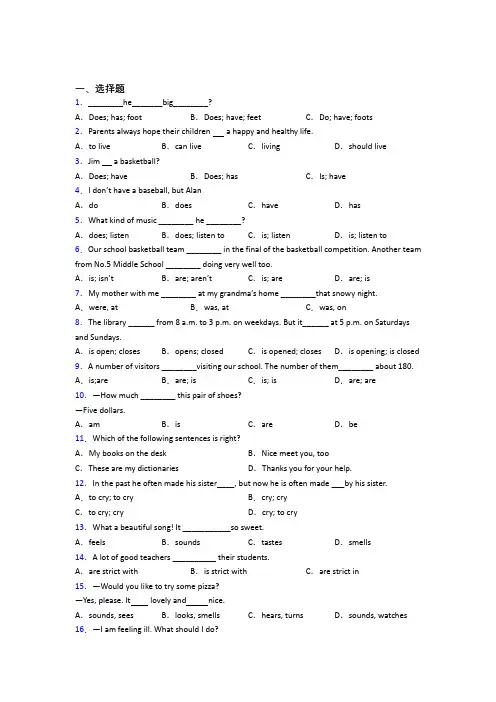
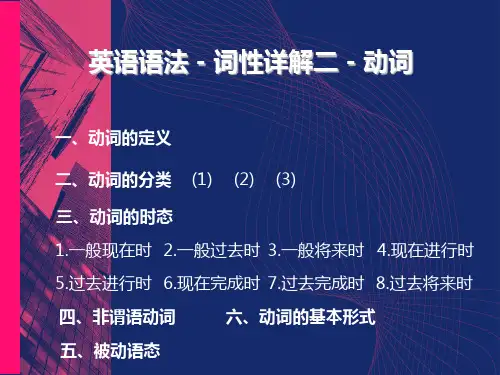
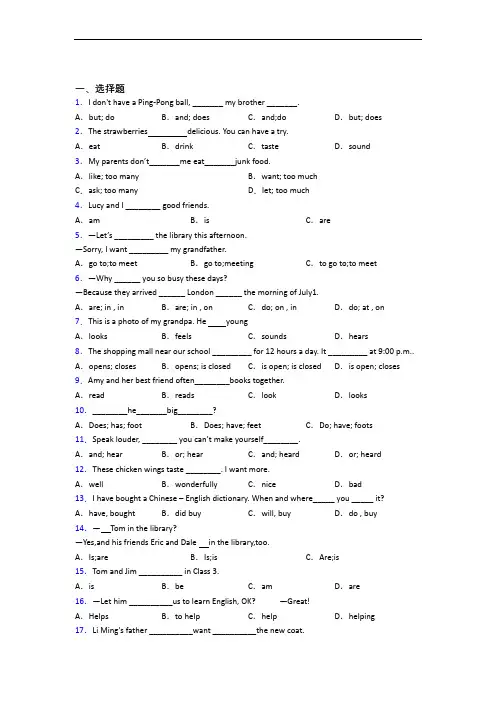
一、选择题1.I don't have a Ping-Pong ball, _______ my brother _______.A.but; do B.and; does C.and;do D.but; does 2.The strawberries delicious. You can have a try.A.eat B.drink C.taste D.sound3.My parents don’t_______me eat_______junk fo od.A.like; too many B.want; too muchC.ask; too many D.let; too much4.Lucy and I ________ good friends.A.am B.is C.are5.—Let’s _________ the library this afternoon.—Sorry, I want _________ my grandfather.A.go to;to meet B.go to;meeting C.to go to;to meet 6.—Why ______ you so busy these days?—Because they arrived ______ London ______ the morning of July1.A.are; in , in B.are; in , on C.do; on , in D.do; at , on 7.This is a photo of my grandpa. He youngA.looks B.feels C.sounds D.hears8.The shopping mall near our school _________ for 12 hours a day. It _________ at 9:00 p.m.. A.opens; closes B.opens; is closed C.is open; is closed D.is open; closes 9.Amy and her best friend often________books together.A.read B.reads C.look D.looks10.________he_______big________?A.Does; has; foot B.Does; have; feet C.Do; have; foots 11.Speak louder, ________ you can’t make yourself________.A.and; hear B.or; hear C.and; heard D.or; heard 12.These chicken wings taste ________. I want more.A.well B.wonderfully C.nice D.bad13.I have bought a Chinese – English dictionary. When and where_____ you _____ it? A.have, bought B.did buy C.will, buy D.do , buy 14.— Tom in the library?—Yes,and his friends Eric and Dale in the library,too.A.Is;are B.Is;is C.Are;is15.Tom and Jim __________ in Class 3.A.is B.be C.am D.are16.—Let him __________us to learn English, OK? —Great!A.Helps B.to help C.help D.helping17.Li Ming's father __________want __________the new coat.A.doesn't; buy B.don't; to buy C.don't; buy D.doesn't; to buy 18.—Who are you _______? — My mother.A.wait B.waiting C.waiting for D.wait for 19.—What __________ he do? —He __________ an actor.A.is, is B.does, does C.does, is D.is, does 20.— How ________ your trip to Australia?— Gre at. I’ll go there again next year.A.was B.is C.are D.were21.--Lucy______her mother and her mother______very young.A.looks like; looks like B.looks like; looksC.looks; looks like D.looks; looks22.Nothing ______ difficult if you put your heart into it.A.is B.are C.am D.Be23.If it _________rain tomorrow,I will ride to school with you.A.didn’t B.doesn’t C.won’t D.don’t24.Tom and I ________ good friends. He is twelve(12岁).A.are B.am C.is D.be 25.—Would you like to try some pizza?—Yes, please. It lovely and nice.A.sounds, sees B.looks, smells C.hears, turns D.sounds, watches 【参考答案】***试卷处理标记,请不要删除一、选择题1.D解析:D【解析】【分析】【详解】句意:我没有乒乓球,但是我兄弟有。
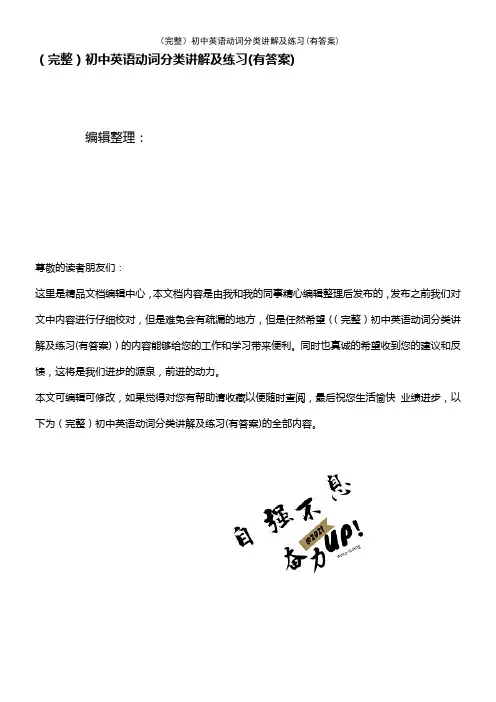
(完整)初中英语动词分类讲解及练习(有答案)编辑整理:尊敬的读者朋友们:这里是精品文档编辑中心,本文档内容是由我和我的同事精心编辑整理后发布的,发布之前我们对文中内容进行仔细校对,但是难免会有疏漏的地方,但是任然希望((完整)初中英语动词分类讲解及练习(有答案))的内容能够给您的工作和学习带来便利。
同时也真诚的希望收到您的建议和反馈,这将是我们进步的源泉,前进的动力。
本文可编辑可修改,如果觉得对您有帮助请收藏以便随时查阅,最后祝您生活愉快业绩进步,以下为(完整)初中英语动词分类讲解及练习(有答案)的全部内容。
动词概述表示动作或状态的词叫做动词。
可以分为以下四类:一、实义动词■①及物动词与不及物动词根据后面是否带宾语,行为动词又可分为及物动词和不及物动词,及物动词。
Vt. vi 。
They study hard。
I know them well。
注:有的动词既可作及物动词,也可用作不及物动词.如:She sings very well。
She sang an English song just now。
英语里有不少实义动词可以兼作及物动词和不及物动词。
兼作及物动词和不及物动词时,____不变。
试比较:Shall I begin at once?She began working as a librarian after she left school.When did they leave Chicago?They left last week.短语:■②动态动词和静态动词动态动词表示动作,如give, take, work, run等;静态动词表示感觉、情感、内心世界、相互关系等,如know, exist, be, have, appear, prove, concern,hate, dislike, like, love, surprise, include, depend on, belong to, guess, suppose,imagine, believe, doubt, admire, envy等。
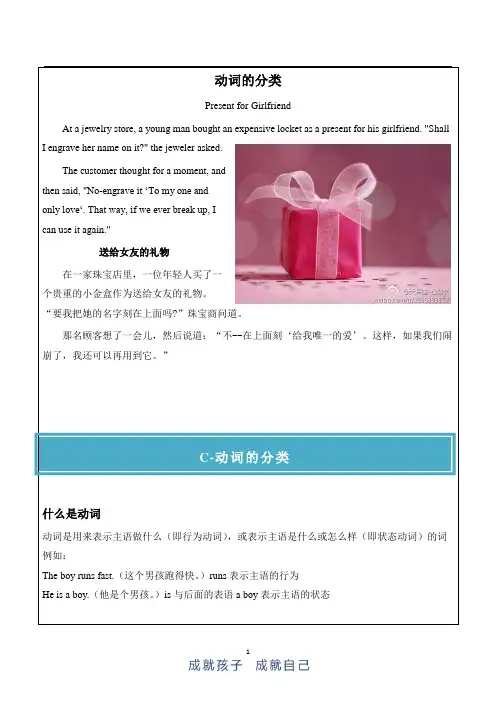
动词的分类Present for GirlfriendAt a jewelry store, a young man bought an expensive locket as a present for his girlfriend. "Shall I engrave her name on it?" the jeweler asked.The customer thought for a moment, andthen said, "No-engrave it ‘To my one andonly love‘. That way, if we ever break up, Ican use it again."送给女友的礼物在一家珠宝店里,一位年轻人买了一个贵重的小金盒作为送给女友的礼物。
“要我把她的名字刻在上面吗?”珠宝商问道。
那名顾客想了一会儿,然后说道:“不--在上面刻‘给我唯一的爱’。
这样,如果我们闹崩了,我还可以再用到它。
”C-动词的分类什么是动词动词是用来表示主语做什么(即行为动词),或表示主语是什么或怎么样(即状态动词)的词例如:The boy runs fast.(这个男孩跑得快。
)runs表示主语的行为He is a boy.(他是个男孩。
)is与后面的表语a boy表示主语的状态动词的分类一、动词可以按照含义及它们在句中的作用分成四类,即行为动词(也称实义动词)、连系动词、助动词和情态动词。
(一)、行为动词行为动词(实义动词)是表示行为、动作或状态的词。
它的词义完整,可以单独作谓语。
例如:I live in Beijing with my mother.(我和我妈妈住在北京。
)live,住It has a round face.(它有一张圆脸。
)has,有(二)、连系动词系动词亦称连系动词(Link Verb),作为系动词,它本身有词义,但不能单独用作谓语,后边必须跟表语(亦称补语),构成系表结构说明主语的状况、性质、特征等情况。
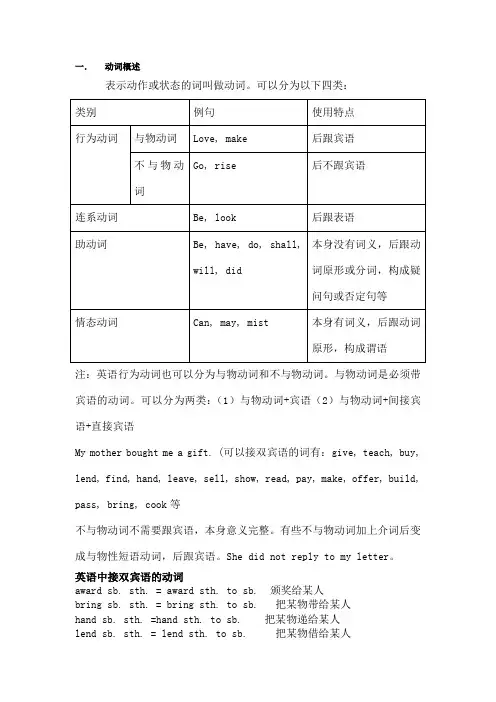
一.动词概述表示动作或状态的词叫做动词。
可以分为以下四类:注:英语行为动词也可以分为与物动词和不与物动词。
与物动词是必须带宾语的动词。
可以分为两类:(1)与物动词+宾语(2)与物动词+间接宾语+直接宾语My mother bought me a gift. (可以接双宾语的词有:give, teach, buy, lend, find, hand, leave, sell, show, read, pay, make, offer, build, pass, bring, cook等不与物动词不需要跟宾语,本身意义完整。
有些不与物动词加上介词后变成与物性短语动词,后跟宾语。
She did not reply to my letter。
英语中接双宾语的动词award sb. sth. = award sth. to sb. 颁奖给某人bring sb. sth. = bring sth. to sb. 把某物带给某人hand sb. sth. =hand sth. to sb. 把某物递给某人lend sb. sth. = lend sth. to sb. 把某物借给某人mail sb. sth. = mail sth. to sb. 把某物寄给某人offer sb. sth. = offer sth. to sb. 将某物给某人owe sb. sth. = owe sth. to sb. 欠某人某物pass sb. sth. = pass sth. to sb. 把某物递给某人pay sb. sth. = pay sth. to sb. 付给某人某物(钱)post sb. sth. = post sth. to sb. 把某物寄给某人read sb. sth. = read sth. to sb. 把某物读给某人听return sb.sth. = return sth. to sb. 把某物还给某人send sb. sth. = send sth. to sb. 把某物送给某人sell sb. sth. = sell sth. to sb. 把某物卖给某人serve sb. sth. = serve sth. to sb. 拿某物招待某人show sb. sth. = show sth. to sb. 拿某物给某人看take sb. sth. = take sth. to sb. 把某物拿给某人teach sb. sth. = teach sth. to sb. 教某人某物tell sb. sth. = tell sth. to sb. 告诉某人某情况throw sb. sth. = throw sth. to sb. 把某物扔给某人write sb. sth. = write sth. to sb. 给某人写信2、双宾语易位时需借助介词for的常用动词book sb. sth. = book sth. for sb. 为某人预定某物buy sb. sth. = buy sth. for sb. 为某人买某物choose sb. sth. = choose sth. for sb. 为某人选某物cook sb. sth. = cook sth. for sb. 为某人煮某物draw sb. sth. = draw sth. for sb. 为某人画某物fetch sb. sth. = fetch sth. for sb. 为某人去取某物find sb. sth. = find sth. for sb. 为某人找到某物fix sb. sth. = fix sth. for sb. 为某人准备某物get sb. sth. = get sth. for sb. 为某人拿来某物make sb. sth. = make sth. for sb. 为某人做某物order sb. sth. = order sth. for sb. 为某人订购某物pick sb. sth. = pick sth. for sb. 为某人采摘某物prepare sb. sth. = prepare sth. for sb. 为某人准备某物save sb. sth. = save sth. for sb. 为某人留某物sing sb. sth. = sing sth. for sb. 为某人唱某物(歌)spare sb. sth. = spare sth. for sb. 为某人让出某物steal sb. sth. = steal sth. for sb. 为某人偷某物3、有的动词后接的双宾语易位时,既可用介词to引出间接宾语,也可用介词for引出间接宾语,含义相同。
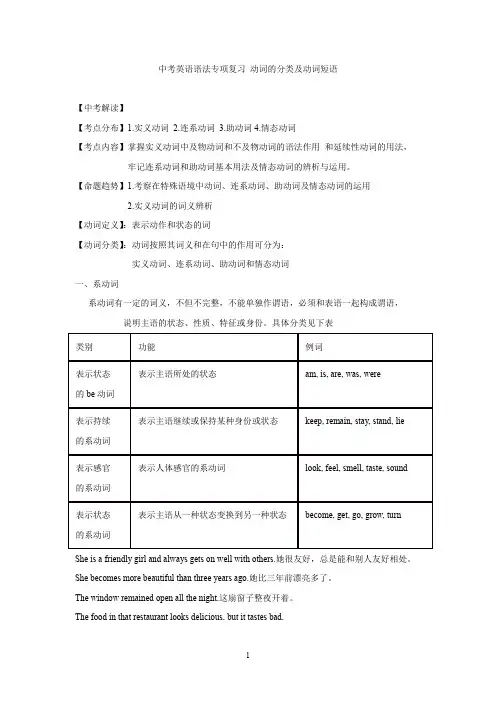
中考英语语法专项复习动词的分类及动词短语【中考解读】【考点分布】1.实义动词2.连系动词3.助动词4.情态动词【考点内容】掌握实义动词中及物动词和不及物动词的语法作用和延续性动词的用法,牢记连系动词和助动词基本用法及情态动词的辨析与运用。
【命题趋势】1.考察在特殊语境中动词、连系动词、助动词及情态动词的运用2.实义动词的词义辨析【动词定义】:表示动作和状态的词【动词分类】:动词按照其词义和在句中的作用可分为:实义动词、连系动词、助动词和情态动词一、系动词系动词有一定的词义,不但不完整,不能单独作谓语,必须和表语一起构成谓语,说明主语的状态、性质、特征或身份。
具体分类见下表She is a friendly girl and always gets on well with others.她很友好,总是能和别人友好相处。
She becomes more beautiful than three years ago.她比三年前漂亮多了。
The window remained open all the night.这扇窗子整夜开着。
The food in that restaurant looks delicious, but it tastes bad.那家餐馆的食物看起来不错,但尝起来难吃。
【注意】:(1)一般情况下,系动词没有被动语态形式。
(2)表示状态的系动词一般不用于进行时(feel除外);变化系动词表示“渐渐……”,可用于进行时。
It’s getting warmer and warmer.天气渐渐变得暖和。
[同步练习]①—The oranges ____________sweet.—Of course. They are from Yongxing, Chenzhou.taste B. eat C. drink②—Why do you ______ so upset?—Because I didn’t get the first place in the English competition.look B.sound C.smell D. feelKey:A,A二、助动词助动词:本身没有词义,不能单独作谓语,只能和实义动词或系动词一起构成谓语,以表示时态、语态、语气、人称和数,构成否定、疑问、强调、省略等。
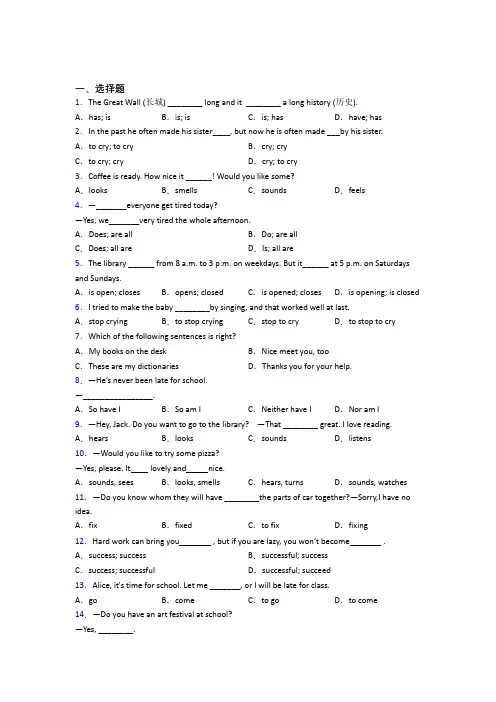
一、选择题1.The Great Wall (长城) ________ long and it ________ a long history (历史).A.has; is B.is; is C.is; has D.have; has2.In the past he often made his sister____, but now he is often made ___by his sister.A.to cry; to cry B.cry; cryC.to cry; cry D.cry; to cry3.Coffee is ready. How nice it ______! Would you like some?A.looks B.smells C.sounds D.feels4.—_______everyone get tired today?—Yes, we_______very tired the whole afternoon.A.Does; are all B.Do; are allC.Does; all are D.Is; all are5.The library ______ from 8 a.m. to 3 p.m. on weekdays. But it______ at 5 p.m. on Saturdays and Sundays.A.is open; closes B.opens; closed C.is opened; closes D.is opening; is closed 6.I tried to make the baby ________by singing, and that worked well at last.A.stop crying B.to stop crying C.stop to cry D.to stop to cry 7.Which of the following sentences is right?A.My books on the desk B.Nice meet you, tooC.These are my dictionaries D.Thanks you for your help.8.—He’s never been late for school.—________________.A.So have I B.So am I C.Neither have I D.Nor am I 9.—Hey, Jack. Do you want to go to the library? —That ________ great. I love reading. A.hears B.looks C.sounds D.listens 10.—Would you like to try some pizza?—Yes, please. It lovely and nice.A.sounds, sees B.looks, smells C.hears, turns D.sounds, watches 11.—Do you know whom they will have ________the parts of car together?—Sorry,I have no idea.A.fix B.fixed C.to fix D.fixing12.Hard work can bring you , but if you a re lazy, you won’t become . A.success; success B.successful; successC.success; successful D.successful; succeed13.Alice, it's time for school. Let me _______, or I will be late for class.A.go B.come C.to go D.to come 14.—Do you have an art festival at school?—Yes, ________.A.we have B.we can C.we do15.In fact (事实上), she ________ ________ many ________.A.doesn’t has; toies B.don’t has; toies C.doesn’t have; toys D.don’t have; toys 16.—Where__________ your friend __________from?—He comes from England.A.is; come B.do; come C.does; come D.are; be 17.Their eyes __________blue, but ours_________black.A.are; are B.is; are C.are; is . D.are; is 18.When did your father your mother?A.marry B.marry to C.marry with D.get married 19.—What __________ he do? —He __________ an actor.A.is, is B.does, does C.does, is D.is, does20.Our teachers always make us ________ a lot of homework.A.to do B.do C.does D.doing21.— How ________ your trip to Australia?—Great. I’ll go there again next yea r.A.was B.is C.are D.were22.I often play volleyball after class. But my cousin Lily _________.A.does B.doesn’t C.do D.don’t23.A lot of good teachers __________ their students.A.are strict with B.is strict with C.are strict in24.Tom and I ________ good friends. He is twelve(12岁).A.are B.am C.is D.be25.I have bought a Chinese – English dictionary. When and where_____ you _____ it? A.have, bought B.did buy C.will, buy D.do , buy【参考答案】***试卷处理标记,请不要删除一、选择题1.C解析:C【解析】【分析】【详解】句意:长城很长,而且它有很长的历史。
一、选择题1.Li Ming's father __________want __________the new coat.A.doesn't; buy B.don't; to buy C.don't; buy D.doesn't; to buy 2.My mother with me ________ at my grandma’s home ________that snowy night. A.were, at B.was, at C.was, on3.—_______everyone get tired today?—Yes, we_______very tired the whole afternoon.A.Does; are all B.Do; are allC.Does; all are D.Is; all are4.Lucy and I ________ good friends.A.am B.is C.are5.There________some water in the bottle.A.is B.am C.are D.be6.— The books on the table_________ Mike’s, right?—Yes, they are.A.am B.is C.are7.Speak louder, ________ you can’t make yourself________.A.and; hear B.or; hear C.and; heard D.or; heard 8.—Would you like to try some pizza?—Yes, please. It lovely and nice.A.sounds, sees B.looks, smells C.hears, turns D.sounds, watches 9.This my sister and those my brothers.A.is, is B.are, are C.is, are10.—Do you know whom they will have ________the parts of car together?—Sorry,I have no idea.A.fix B.fixed C.to fix D.fixing11.I don't have a Ping-Pong ball, _______ my brother _______.A.but; do B.and; does C.and;do D.but; does 12.Parents always hope their children a happy and healthy life.A.to live B.can live C.living D.should live 13.—Where__________ your friend __________from?—He comes from England.A.is; come B.do; come C.does; come D.are; be 14.2019 has come. I hope everyone can make his dream ________.A.came true B.come true C.comes true D.coming true 15.— When and where shall we meet?— Let's ________it half past nine.A.meet B.make C.do16.Our teachers always make us ________ a lot of homework.A.to do B.do C.does D.doing17.— How ________ your trip to Australia?—Great. I’ll go there again next year.A.was B.is C.are D.were18.The baby is crying. Her brother tries her best to make her ______A.to laugh B.laugh C.laughing D.laughed19.As we all know, the Anti-Japanese War ________ in 1937, and ________ for eight years. A.was broken out; lasted B.broke into;lastedC.broke out; was lasted D.broke out;lasted20.I often play volleyball after class. But my cousin Lily _________.A.does B.doesn’t C.do D.don’t21.— How sweet the flowers _____ in spring!— Yes, many tourists come to enjoy them every day.A.taste B.smell C.feel22.A lot of good teachers __________ their students.A.are strict with B.is strict with C.are strict in23.Peter has never seen such a big fish in his life, ________?A.has he B.hasn’t he C.does he D.doesn't he24.________your brother________ a baseball?A.Do; have B.Does; has C.Does; have D.Do; has25.Tom and Jim __________ in Class 3.A.is B.be C.am D.are【参考答案】***试卷处理标记,请不要删除一、选择题1.D解析:D【解析】【分析】【详解】句意:李明的爸爸不想买这个新外套。
一、选择题1.This my sister and those my brothers.A.is, is B.are, are C.is, are2.—________ Mary________ fruit? —Of course.A.Is; like B.Does; likes C.Does; like D.Do; likes 3.The teacher's smile made me ________ better.A.feel B.to feel C.feeling D.felt 4.—Listen! I can hear someone __________ for help.—Is there __________?A.calling; anything wrong B.call; anything wrongC.calling; wrong anything D.call; wrong anything5.— ________ your cousin and her friends like history?—Yes, they ________ it’s very interesting.A.Does; think B.Do ; think C.Do; thinks6.—_______everyone get tired today?—Yes, we_______very tired the whole afternoon.A.Does; are all B.Do; are allC.Does; all are D.Is; all are7.Lucy and I ________ good friends.A.am B.is C.are8.—Let’s _________ the library this afternoon.—Sorry, I want _________ my grandfather.A.go to;to meet B.go to;meeting C.to go to;to meet 9.I tried to make the baby ________by singing, and that worked well at last.A.stop crying B.to stop crying C.stop to cry D.to stop to cry 10.—How much ________ this pair of shoes?—Five dollars.A.am B.is C.are D.be 11.—William, your hat _______ nice.—Thanks.A.buys B.looks C.finds12.Hard work can bring you , but if you are lazy, you won’t become . A.success; success B.successful; successC.success; successful D.successful; succeed13.—He’s never been late for school.—________________.A.So have I B.So am I C.Neither have I D.Nor am I 14.Mike and Jeff________ TV on weekdays.A.doesn't watch B.don't watch C.watches D.not watch 15.Karen and Helen _______ my brother's friends. I know _______.A.is; her B.are; them C.are; her D.is; them 16.Their eyes __________blue, but ours_________black.A.are; are B.is; are C.are; is . D.are; is17.Li Ming's father __________want __________the new coat.A.doesn't; buy B.don't; to buy C.don't; buy D.doesn't; to buy 18.When did your father your mother?A.marry B.marry to C.marry with D.get married 19.— When and where shall we meet?— Let's ________it half past nine.A.meet B.make C.do20.Some bananas ______ in the bag. Some mutton ______ on the table.A.are; are B.is; is C.are; is D.is; are21.Our teachers always make us ________ a lot of homework.A.to do B.do C.does D.doing22.The baby is crying. Her brother tries her best to make her ______A.to laugh B.laugh C.laughing D.laughed23.I don’t have a baseball, but my brother_________.A.is B.has C.does24.If it _________rain tomorrow,I will ride to school with you.A.didn’t B.doesn’t C.won’t D.don’t25.The shopping mall near our school _________ for 12 hours a day. It _________ at 9:00 p.m.. A.opens; closes B.opens; is closed C.is open; is closed D.is open; closes【参考答案】***试卷处理标记,请不要删除一、选择题1.C解析:C【解析】【分析】【详解】句意:这是我姐姐,那些是我哥哥。
初中英语语法之动词的分类讲解加练习答案动词分类动词是用来描述主语的行为或状态的词语。
根据它们的含义和在句子中的作用,动词可以分为四类:行为动词(也称实义动词)、连系动词、助动词和情态动词。
行为动词行为动词(实义动词)表示行为、动作或状态。
它们的词义完整,可以独立作为谓语。
例如:I live in Beijing with my ___.(我和我妈妈住在北京。
)live,表示“住”It has a round face.(它有一张圆脸。
)has,表示“有”连系动词连系动词(也称系动词)本身有词义,但不能单独用作谓语,必须与表语(也称补语)一起构成系表结构,说明主语的状态、性质、特征等情况。
连系动词后不可接副词,只能接形容词。
大致分为七种:1)状态系动词:用来表示主语的状态,只有be一词,例如:He is a ___.(他是一名教师。
)is与表语一起说明主语的身份。
I am fine.2)持续系动词:表示主语的持续状态,例如:She is ___.(她正在睡觉。
)___ ___.(婴儿在哭泣。
)3)感官系动词:表示主语的感官状态,例如:The soup ___.(汤闻起来很香。
)___ ___.(花看起来很美。
)4)变化系动词:表示主语的变化状态,例如:___.(天气正在变化。
)___ ___.(树叶正在变黄。
)5)成为系动词:表示主语的转变状态,例如:___.(她成为了一名医生。
)___ ___.(毛毛虫变成了蝴蝶。
)6)保持系动词:表示主语的保持状态,例如:___ calm.(他保持冷静。
)___.(情况保持不变。
)7)证明系动词:表示主语的证明状态,例如:___ his innocence.(证据证明他无罪。
)___.(这个理论仍未被证明。
)助动词和情态动词助动词和情态动词都是用来帮助其他动词的,不具备独立的词义。
助动词用来构成时态和语态,情态动词则用来表示可能性、建议、义务等情态。
例如:He is running.(他正在跑步。
中考英语动词分类讲解及练习(有答案)动词综合讲解一、实义动词■①及物动词与不及物动词根据后面是否带宾语,行为动词又可分为及物动词和不及物动词,及物动词。
Vt. vi .They study hard.I know them well.注:有的动词既可作及物动词,也可用作不及物动词。
如:She sings very well.She sang an English song just now.英语里有不少实义动词可以兼作及物动词和不及物动词Shall I begin at once?She began working as a librarian after she left school.When did they leave Chicago?They left last week.短语:■②动态动词和静态动词动态动词表示动作,如give, take, work, run等;静态动词表示感觉、情感、内心世界、相互关系等,如know, exist, be, have, appear, prove, concern, hate, dislike, like, love, surprise, include, depend on, belong to, guess, suppose,imagine, believe, doubt, admire, envy等。
■③延续性动词和非延续性动词根据动作是否延续,行为动词又分为延续性动词和非延续性动词。
如rain, live, work, learn等是延续性动词,go, come, leave, start, arrive, join, finish, end等是非延续性动词。
注:非延续性动词在肯定句中通常不与表示时间段连用的for短语连用。
如:[译]他离开这里三天了。
[误]He has left here for three days.[正]He has been away from here for three days.[正]He left here three days ago.[正]It’s three days since he left.■④限定动词与非限定动词限定动词在句中作谓语,有人称和数的变化。
一、选择题1.—I am feeling ill. What should I do?— eating junk food and breakfast every day.A.Stop; having B.Stop; have C.To stop; have. D.To stop; to have 2.The strawberries delicious. You can have a try.A.eat B.drink C.taste D.sound 3.—Listen! I can hear someone __________ for help.—Is there __________?A.calling; anything wrong B.call; anything wrongC.calling; wrong anything D.call; wrong anything4.Our school basketball team ________ in the final of the basketball competition. Another team from No.5 Middle School ________ doing very well too.A.is; isn’t B.are; aren’t C.is; are D.are; is5.—_______everyone get tired today?—Yes, we_______very tired the whole afternoon.A.Does; are all B.Do; are allC.Does; all are D.Is; all are6.—Why ______ you so busy these days?—Because they arrived ______ London ______ the morning of July1.A.are; in , in B.are; in , on C.do; on , in D.do; at , on 7.—How much ________ this pair of shoes?—Five dollars.A.am B.is C.are D.be8.This is a photo of my grandpa. He youngA.looks B.feels C.sounds D.hears9.—When you free last week?— Well, I have a free day because there was too much work.A.did; didn’t B.were; didn’t C.were; wasn’t D.did; wasn’t 10.—He’s never been late for school.—________________.A.So have I B.So am I C.Neither have I D.Nor am I 11.—Hey, Jack. Do you want to go to the library? —That ________ great. I love reading. A.hears B.looks C.sounds D.listens12.Many students are so crazy about mobile games that they lose interest in their schoolwork, which _________ their parents and teachers a lot.A.worries about B.is worried about C.worries D.is worried 13.Speak louder, ________ you can’t make yourself________.A.and; hear B.or; hear C.and; heard D.or; heard14.2019 has come. I hope everyone can make his dream ________.A.came true B.come true C.comes true D.coming true 15.This my sister and those my brothers.A.is, is B.are, are C.is, are16.Their eyes __________blue, but ours_________black.A.are; are B.is; are C.are; is . D.are; is 17.—Let him __________us to learn English, OK? —Great!A.Helps B.to help C.help D.helping 18.The baby is crying. Her brother tries her best to make her ______A.to laugh B.laugh C.laughing D.laughed 19.—I saw Betty go to Grandpa Zhang’s home just now.—Yes, she is often seen ________ the old man with his housework.A.help B.to help C.helps D.helped 20.As we all know, the Anti-Japanese War ________ in 1937, and ________ for eight years. A.was broken out; lasted B.broke into;lastedC.broke out; was lasted D.broke out;lasted21.I don’t have a baseball, but my brother_________.A.is B.has C.does22.Mike and Jeff________ TV on weekdays.A.doesn't watch B.don't watch C.watches D.not watch 23.________your brother________ a baseball?A.Do; have B.Does; has C.Does; have D.Do; has 24.—Do you have an art festival at school?—Yes, ________.A.we have B.we can C.we do25.What a beautiful song! It ___________so sweet.A.feels B.sounds C.tastes D.smells【参考答案】***试卷处理标记,请不要删除一、选择题1.B解析:B【解析】【分析】【详解】句意:——我感觉生病了。
动词概述一、实义动词■①及物动词与不及物动词根据后面是否带宾语,行为动词又可分为及物动词和不及物动词,及物动词。
Vt. vi .They study hard.I know them well.注:有的动词既可作及物动词,也可用作不及物动词。
如:She sings very well.She sang an English song just now.英语里有不少实义动词可以兼作及物动词和不及物动词。
兼作及物动词和不及物动词时,____不变。
试比较:Shall I begin at once?She began working as a librarian after she left school.When did they leave Chicago?They left last week.短语:■②动态动词和静态动词动态动词表示动作,如give, take, work, run等;静态动词表示感觉、情感、内心世界、相互关系等,如know, be, have, appear, hate, dislike, like, love, surprise, include, depend on, belong to, guess, suppose,imagine, believe, admire,等。
■③延续性动词和非延续性动词根据动作是否延续,行为动词又分为延续性动词和非延续性动词。
如rain, live, work, learn等是延续性动词,go, come, leave, start, arrive, join, finish, end等是非延续性动词。
注:非延续性动词在肯定句中通常不与表示时间段连用的for短语连用。
如:[译]他离开这里三天了。
[误]He has left here for three days.[正]He has been away from here for three days.[正]He left here three days ago.[正]It’s three days since he left.■④限定动词与非限定动词限定动词在句中作谓语,有人称和数的变化。
一、选择题1.— What kind of home do you ? — A flat three bedrooms.A.live in; with B.live; with C.live in; has D.live; has2.—________ Mary________ fruit? —Of course.A.Is; like B.Does; likes C.Does; like D.Do; likes 3.These chicken wings taste ________. I want more.A.well B.wonderfully C.nice D.bad4.Coffee is ready. How nice it ______! Would you like some?A.looks B.smells C.sounds D.feels5.—Listen! I can hear someone __________ for help.—Is there __________?A.calling; anything wrong B.call; anything wrongC.calling; wrong anything D.call; wrong anything6.Our school basketball team ________ in the final of the basketball competition. Another team from No.5 Middle School ________ doing very well too.A.is; isn’t B.are; aren’t C.is; are D.are; is7.—Let’s _________ the library this afternoon.—Sorry, I want _________ my grandfather.A.go to;to meet B.go to;meeting C.to go to;to meet8.This is a photo of my grandpa. He youngA.looks B.feels C.sounds D.hears9.—When you free last week?— Well, I have a free day because there was too much work.A.did; didn’t B.were; didn’t C.were; wasn’t D.did; wasn’t 10.—The books on the table_________ Mike’s, right?—Yes, they are.A.am B.is C.are11.This pair of pants______gray. What color________your pants?A.are; are B.is;is C.is;are12.—Do you like watching cooking programs on TV?—No, I don’t , but my twin brother . He's very fond of cooking.A.does B.do C.is D.are13.—I am feeling ill. What should I do?— eating junk food and breakfast every day.A.Stop; having B.Stop; have C.To stop; have. D.To stop; to have 14.2019 has come. I hope everyone can make his dream ________.A.came true B.come true C.comes true D.coming true15.I don't have a Ping-Pong ball, _______ my brother _______.A.but; do B.and; does C.and;do D.but; does 16.The Great Wall (长城) ________ long and it ________ a long history (历史).A.has; is B.is; is C.is; has D.have; has17.In fact (事实上), she ________ ________ many ________.A.doesn’t has; toies B.don’t has; toies C.doesn’t have; toys D.don’t have; toys 18.— When and where shall we meet?— Let's ________it half past nine.A.meet B.make C.do19.— How ________ your trip to Australia?—Great. I’ll go there again next year.A.was B.is C.are D.were20.The baby is crying. Her brother tries her best to make her ______A.to laugh B.laugh C.laughing D.laughed 21.— How sweet the flowers _____ in spring!— Yes, many tourists come to enjoy them every day.A.taste B.smell C.feel22.The air _______ fresh after the rain. And the sky is blue.A.feels B.tastes C.smells D.sounds 23.Tom and I ________ good friends. He is twelve(12岁).A.are B.am C.is D.be24.—Do you have an art festival at school?—Yes, ________.A.we have B.we can C.we do25.Speak louder, ________ you can’t make yourself________.A.and; hear B.or; hear C.and; heard D.or; heard【参考答案】***试卷处理标记,请不要删除一、选择题1.A解析:A【解析】【详解】句意:-你喜欢住在什么样的家里?-一个带三个卧室的公寓。
考查谓语动词,live in住在某地;live居住,不及物动词;has有,动词;with带有,介词。
在第一个句子中,what是句子的宾语,故live后应加介词in,排除B和D;答语是省略回答,完整回答是I live in a flat….,故空后是一个后置定语,修饰名词A flat,应用介词with。
故选A。
2.C解析:C【解析】【详解】句意:——玛丽喜欢水果吗?——当然。
考查助动词和一般现在时的动词三单。
分析句子可知,此句谓语动词是行为动词like,主语是Mary,所以一般疑问句需借助动词does帮忙,用于句首需大写首字母,其后动词使用动词原形。
故选C。
3.C解析:C【解析】【详解】句意:这些鸡翅尝起来不错。
我想要更多。
考查感官动词的用法及形容词辨析。
well好,副词;wonderfully精彩地;nice好的;bad 坏的。
taste是感官系动词,其后接形容词作表语,排除AB;根据题干中“I want more.”可知鸡翅尝起来很好,排除D。
故选C。
4.B解析:B【解析】句意:咖啡准备好了。
闻起来多香啊!您来点儿吗?考查系动词辨析题。
A. looks看上去;B. smells闻起来;C. sounds听起来;D. feels感觉。
本句是感叹句,根据句意和语境,可知ACD三个选项意思都与句意不符,故选B。
5.A解析:A【解析】【详解】句意:——听!我听见有人在呼救。
——有什么不对劲吗?考查感官动词和形容词做定语修饰不定代词的用法。
听到某人干某事hear sb do/doing sth;根据句中Listen!听的提示,说明听到的动作正在进行,所以感官动词hear应用hear sb doing sth结构,故排除B、D项;当有形容词wrong修饰不定代词anything时,形容词必须后置,故排除C项,故选A。
6.C解析:C【解析】【详解】句意:我们学校的篮球队在篮球比赛中进入了决赛。
另一支来自第五中学的队员们表现也很好。
考查be动词和集体名词的主谓一致。
分析第一处可知,此处表示“球队”的含义,指单数整体,所以be动词使用is;根据“doing very well too”可知,表现好的是队员而不是无生命的球队,所以第二处表示“队员”,指复数概念,又根据“too”可知,此处表示肯定含义“表现得好”。
故选C。
7.A解析:A【解析】【详解】句意:——让我们今天下午去图书馆。
——抱歉,我想要去见我的爷爷。
考查非谓语动词。
go去;meet见。
let是使役动词,其后接动词原形作宾语补足语,第一空用go to;want to do sth.想要做某事,第二空用动词不定式to meet作宾语。
故选A。
【点睛】常见的接动词不定式作宾语的词语还有:hope, plan, want, decide, choose, agree, begin, start, refuse, expect, offer, afford, need, try, forget, remember等。
8.A解析:A【解析】【分析】【详解】句意:这张照片是我爷爷的。
他看上去很年轻。
考查动词。
looks感官动词,看上去;feels感官动词,感觉上;sounds感官动词,听上去;hears动词,听见。
根据句意可知此处表示看爷爷的照片,觉得爷爷看上去年轻。
故选A。
9.B解析:B【解析】试题分析:句意:-上周你什么时候有空?-我没有一天有空,因为有很多工作。
did 助动词;were是be动词的过去式形式。
根据句中的last week可知,这里说的是过去的事情,free是形容词,应跟be动词搭配,故第一个空用were;第二个空后have是实意动词,故用助动词构成否定句。
故选B。
考点:考查助动词。